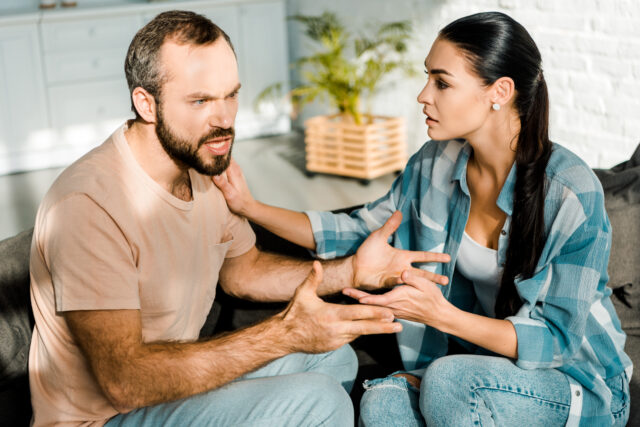Relationship problems don’t always announce themselves with fanfare.

Often, they creep in quietly, eroding your connection over time. Recognising these warning signs early can be the difference between a relationship that thrives and one that crumbles. Here are 16 red flags that indicate it might be time to consider couple’s therapy. Don’t wait until it’s too late to address these issues.
1. You don’t talk anymore.

Communication breakdown is a relationship killer. If you find yourselves coexisting rather than connecting, it’s a major red flag. This isn’t just about quantity, but quality of communication. Superficial chats about schedules or household tasks don’t count. You need deep, meaningful conversations to maintain intimacy. If you can’t remember the last time you had a heart-to-heart, it’s time to address this gap.
2. You’re always walking on eggshells.

Constantly monitoring your words and actions to avoid triggering your partner’s anger or disappointment is exhausting and unhealthy. This hypervigilance creates a tense atmosphere where neither person feels comfortable being themselves. It often stems from unresolved conflicts or unexpressed needs. A therapist can help you both create a safe space for open, honest communication without fear of repercussion.
3. You fight about the same things over and over.

Circular arguments that never reach resolution are a sign that you’re stuck in unhealthy patterns. These repetitive conflicts often mask deeper issues that you’re not addressing. Maybe you’re fighting about dishes, but really struggling with feelings of being unappreciated. A therapist can help you identify the root causes of these recurring fights and develop new strategies for resolving them.
4. Intimacy has gone out the window.

A significant decline in physical intimacy can signal trouble. This isn’t just about sex, but also affectionate touches, kisses, and general physical closeness. While libido fluctuations are normal, a persistent lack of physical connection can indicate underlying emotional issues. It might be unresolved resentment, body image problems, or mismatched desires. Don’t let embarrassment prevent you from addressing this crucial aspect of your relationship.
5. You’d rather talk to anyone but your partner.

When you consistently turn to friends, family, or even colleagues for emotional support instead of your partner, it’s a red flag. While outside perspectives are valuable, your partner should be your primary confidant and source of support. If you’re avoiding vulnerability with them, it’s worth exploring why. Are you afraid of judgment? Feeling emotionally disconnected? A therapist can help rebuild that trust and openness.
6. You’re more like roommates than partners.

Falling into a routine is normal, but feeling like you’re just sharing living space is a problem. This often happens gradually – separate hobbies become separate lives, and you stop making an effort to connect. If you can’t remember the last time you did something fun or romantic together, it’s time to prioritise your partnership. Therapy can help you rediscover shared interests and rebuild your connection.
7. You’re not sure if you like who you are in this relationship.

If you find yourself behaving in ways you don’t recognise or respect – being overly critical, passive-aggressive, or withdrawn – it’s a sign that something in the relationship dynamic is off. Healthy partnerships should bring out the best in both people. If you feel like you’re becoming a worse version of yourself, it’s crucial to address this before resentment sets in.
8. You can’t remember the last time you laughed together.

Laughter and playfulness are vital components of a healthy relationship. If your interactions are constantly serious, tense, or businesslike, you’re missing out on a crucial form of bonding. This loss of joy often creeps in so gradually that you might not notice it until it’s gone. Rekindling that sense of fun and humour can be challenging on your own, but a therapist can help you rediscover it.
9. You’re on totally different pages about the future.

Misaligned goals and expectations can create significant tension. Whether it’s disagreements about having children, career paths, or where to live, these fundamental differences don’t just resolve themselves. If you’re avoiding these discussions or feel stuck in them, a therapist can facilitate productive conversations and help you find common ground or make tough decisions.
10. You’re keeping secrets.

Secrecy breeds distance and distrust. This isn’t just about major betrayals – even small secrets can destroy intimacy over time. If you find yourself hiding things, whether it’s financial decisions, interactions with other people, or personal struggles, it’s a sign that you don’t feel safe being fully open. Therapy can help create an environment where honesty feels safe and valued.
11. You only connect through our kids/work/mutual complaints.

While shared responsibilities or interests can be bonding, they shouldn’t be the only thing keeping you together. If you realise that your children, your jobs, or your shared grievances are the primary topics of conversation, it’s a sign that your personal connection has weakened. You need to nurture your relationship as individuals, not just as co-parents or colleagues.
12. You’re not sure if you trust them anymore.

Trust is the foundation of any healthy relationship. If you find yourself constantly doubting your partner’s words or actions, whether due to past betrayals or current behaviour, it’s a serious issue. Rebuilding trust is challenging but possible with professional guidance. Don’t let suspicion and doubt poison your relationship – address it head-on.
13. You’re stuck in the blame game.

Constantly pointing fingers and keeping score of each other’s faults is toxic. If every discussion turns into a contest of who’s more wrong or who’s suffered more, you’re trapped in an unhealthy cycle. This pattern prevents real problem-solving and breeds resentment. A therapist can help you break this cycle and learn to approach problems as a team.
14. You feel alone even when you’re together.

Emotional disconnection can be more painful than physical distance. If you feel lonely despite spending time with your partner, it’s a sign that your emotional needs aren’t being met. This could be due to poor communication, unresolved conflicts, or simply growing apart. Don’t resign yourself to emotional isolation – it’s possible to rebuild that connection with professional help.
15. You never fight.

While constant conflict is unhealthy, never disagreeing can also be a red flag. It often means you’re avoiding important issues or suppressing your own needs to keep the peace. Healthy relationships involve respectful disagreement and negotiation. If you’re walking on eggshells to avoid any conflict, you’re not addressing important issues. A therapist can help you learn to navigate disagreements productively.
16. You’re not sure if you want the relationship anymore.

If you’re questioning the entire relationship, it’s definitely time for professional help. This doesn’t mean your relationship is doomed – many couples work through periods of doubt. However, it does mean you need to address the issues causing these feelings. A therapist can help you clarify your feelings, communicate them effectively, and make informed decisions about your future together.




